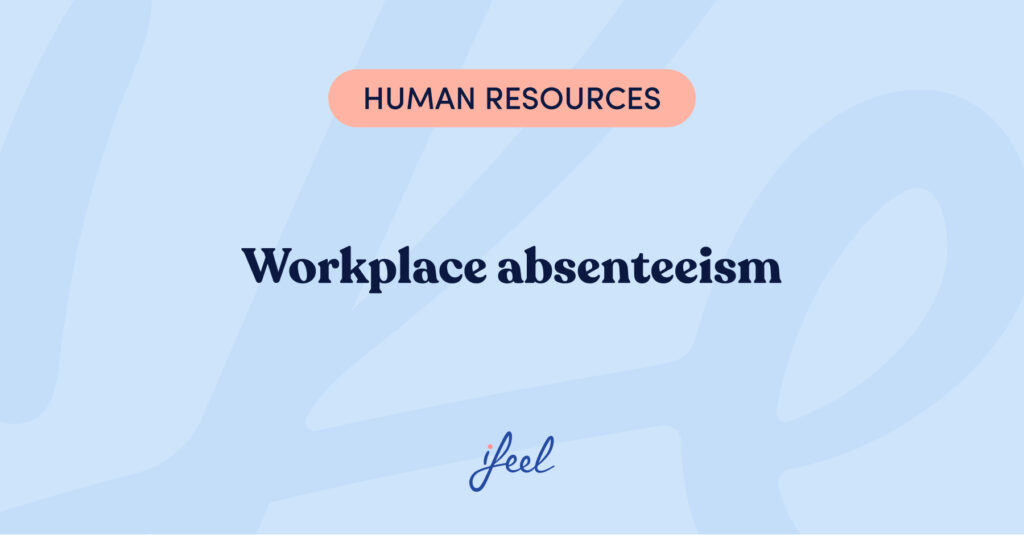In the workplace, the term ‘absenteeism’ is widely known, but few organisations truly understand its implications, causes and consequences. However, absenteeism is a phenomenon that directly impacts productivity, team morale and, of course, companies’ financial results.
Mental health-related absenteeism has emerged as one of the most pressing challenges facing European organisations today. What was once considered a minor workplace concern has evolved into a major factor affecting business operations, employee wellbeing, and organisational sustainability across the continent.
Against this backdrop, a key question arises: what is behind this phenomenon and how can companies effectively reduce absenteeism?
In this article, we will explore the main causes of absenteeism, its impact on organisations and how solutions such as those offered by ifeel can make a difference by tackling this problem at its root: the mental health of employees.
What is absenteeism and why is it important?
Absenteeism refers to unplanned absences of employees from their workplace. This phenomenon is complex and multifactorial, as it is influenced by a combination of personal factors (such as age, gender or educational level), work-related factors (type of contract, working hours, occupation, company size) and contextual factors (sector of activity, geographical environment and economic situation). Each of these elements affects the likelihood of work absences occurring in different ways.
Likewise, these absences can be classified as justified (due to illness, legal leave, licences, etc.) or unjustified, and both have a significant impact on organisations. Furthermore, it is not only the number of absences that is relevant, but also their duration, as this determines the overall impact of absenteeism on the company.
In this context, it is important to distinguish between different types of absenteeism:
- Justified absenteeism: This includes sick leave, legal leave or maternity/paternity leave.
- Unjustified absenteeism: Absences without a valid reason or without prior notice.
- Presenteeism: When employees are physically at work but are not productive due to issues such as stress, burnout or lack of motivation.
Absenteeism not only impacts daily productivity, but also generates significant costs for companies. These include the need to hire temporary staff, redistribute tasks among teams and lose business opportunities. All this makes absenteeism a challenge that organisations must address proactively to reduce absenteeism effectively.
Furthermore, absenteeism is not only a symptom of internal problems, but also directly affects financial performance, team morale and the company’s ability to achieve its strategic objectives. For this reason, understanding and managing it effectively is critical to ensuring business success.
The Leadership Lens🔎
Workplace absenteeism is not just an attendance issue, but a reflection of the organisational climate and team well-being. As a leader, your role is key to addressing it at its root: foster a culture of trust, where employees feel heard and supported. Identify patterns and causes, from personal issues to excessive workloads, and offer personalised solutions. Remember, leading with empathy and prevention not only helps reduce absenteeism, but also boosts productivity and team loyalty. Do you know how you are going to take the first step?
Main causes of absenteeism
Absenteeism does not occur in a vacuum; it is influenced by a variety of factors ranging from personal problems to organisational dynamics. Understanding these causes is essential to reduce absenteeism effectively. Among the most common causes are:
Mental health problems
According to internal data from ifeel, approximately 30% of sick leave is linked to mental health problems. Conditions such as stress, anxiety and depression are responsible for an increasing number of absences, highlighting the need to address this issue proactively to reduce absenteeism.
In addition, the World Health Organisation (WHO) has shown that depression and anxiety cost the global economy $1 trillion a year in lost productivity. This data further underscores the urgency of implementing effective strategies to care for mental health in the workplace and reduce absenteeism.
Working conditions
A toxic work environment, lack of recognition, and work overload can demotivate employees, leading them to take time off. In fact, research has shown that shift work, larger companies, and sectors with rigid structures tend to have higher levels of absenteeism.
Meanwhile, jobs that require a high level of qualification (i.e., those that demand specific skills, advanced training or specialised experience) and sectors that offer greater flexibility (such as flexible hours, remote working or autonomy in organising work) tend to have lower levels of absenteeism.
Lack of work-life balance
The lack of flexibility to balance work and personal responsibilities can lead to exhaustion and stress, which increases absenteeism. Basically, because sectors with greater flexibility allow employees to better balance their personal and professional lives, reducing the need to take time off due to problems such as stress, burnout or difficulties in achieving a work-life balance, ultimately helping to reduce absenteeism.
Physical health problems
Although less common than mental health problems, physical illnesses also contribute significantly to absenteeism.
Lack of commitment
A low level of commitment to the organisation or job satisfaction can lead to employees taking more time off, as they do not feel an emotional connection to their work or do not see it as an environment in which they can develop professionally.
Impact of absenteeism on businesses
Absenteeism has a multidimensional impact on organisations, affecting both financial results and team dynamics. Understanding this impact is crucial for companies looking to reduce absenteeism. Some of the most notable effects include:
| Impact | Description |
|---|---|
| Loss of productivity | Unplanned absences disrupt workflows and affect deadlines |
| Financial costs | These include paying wages during absences, hiring temporary staff, and lost revenue |
| Team morale | Employees who are present may feel overworked, which affects their motivation |
| Staff turnover | Prolonged absenteeism can lead to higher turnover, which increases recruitment and training costs |
How to reduce absenteeism: the role of mental health
The key to reduce absenteeism lies in addressing its underlying causes, especially those related to mental health. This is where mental health solutions for businesses such as those offered by ifeel play a crucial role, as they help companies to reduce absenteeism through:
1. Conduct a real risk assessment
No two companies are the same, and therefore the reasons that can lead to employee absenteeism can vary. In this context, ifeel enables companies to identify their employees’ mental health risk levels, facilitating the implementation of preventive strategies to reduce absenteeism.
2. Personalised plans
After gaining a thorough understanding of your organisation’s characteristics, ifeel develops a personalised plan that allows each employee to receive an action plan tailored to their risk level, from psychoeducational content to individualised therapy. This ensures that interventions are effective and targeted to reduce absenteeism.
3. Fast and scalable care
With ifeel, employees can access a therapist in less than 24 hours, significantly reducing waiting times, allowing problems to be addressed in a timely manner and preventing them from escalating, which helps reduce absenteeism.
However, the impact of ifeel is not limited to quick access to therapy, but also includes a comprehensive approach that benefits the entire organisation.
Support for managers and leaders: Managers play a key role in managing the well-being of their teams. That’s why ifeel offers specific training and tools to help them identify early signs of emotional problems, manage difficult situations and foster a healthy work environment to reduce absenteeism.
Improved work environment: Through surveys and advanced analytics, ifeel helps companies measure and improve their work environment by identifying areas for improvement and designing customised strategies to strengthen team cohesion and engagement.
Workshops and psychoeducational content: In addition to individual therapy, ifeel organises workshops led by expert psychologists, focusing on topics such as stress management, mindfulness, effective communication and emotional leadership. These workshops not only benefit employees, but also empower leaders to build more resilient and productive teams.
This comprehensive approach not only addresses mental health issues reactively, but also fosters a preventive and proactive organisational culture, improving both employee well-being and business results while helping to reduce absenteeism.
Impact measurement
Additionally, ifeel offers tools to measure the clinical and financial impact of its interventions, providing clear data on absenteeism reduction and productivity improvement. This provides up-to-date, objective information that enables informed decisions to be made about how to reduce absenteeism effectively.

Benefits of tackling absenteeism with ifeel
Implementing a comprehensive solution such as ifeel not only helps reduce absenteeism but also generates long-term benefits for the organisation:
- Cost savings: Thanks to ifeel, you can save between €15,000 and €50,000 for each high-risk case identified and treated in time.
- Improved working environment: A healthier and more committed team creates a positive working environment.
- Increased productivity: Employees who feel supported are more productive and less likely to be absent.
- Reduced turnover: By addressing the causes of absenteeism, companies can better retain their talent.
Mental health at work: one of the biggest challenges facing businesses today
Absenteeism is a challenge that requires a comprehensive and proactive strategy. Companies that invest in the emotional well-being of their employees not only reduce absenteeism, but also improve their organisational culture and financial results.
ifeel positions itself as a strategic ally in this process, offering data-driven and personalised solutions that impact both employees and the bottom line while helping organisations reduce absenteeism sustainably.
As one HR leader interviewed said:
‘Ensuring professional well-being, and as far as possible personal well-being, is absolutely critical.’
Javier Sordo Gómez, Head of People at Thoughtworks, an ifeel partner company.
If your organisation is ready to tackle absenteeism at its root and reduce absenteeism effectively, ifeel may be the solution you need. It’s time to take action!











